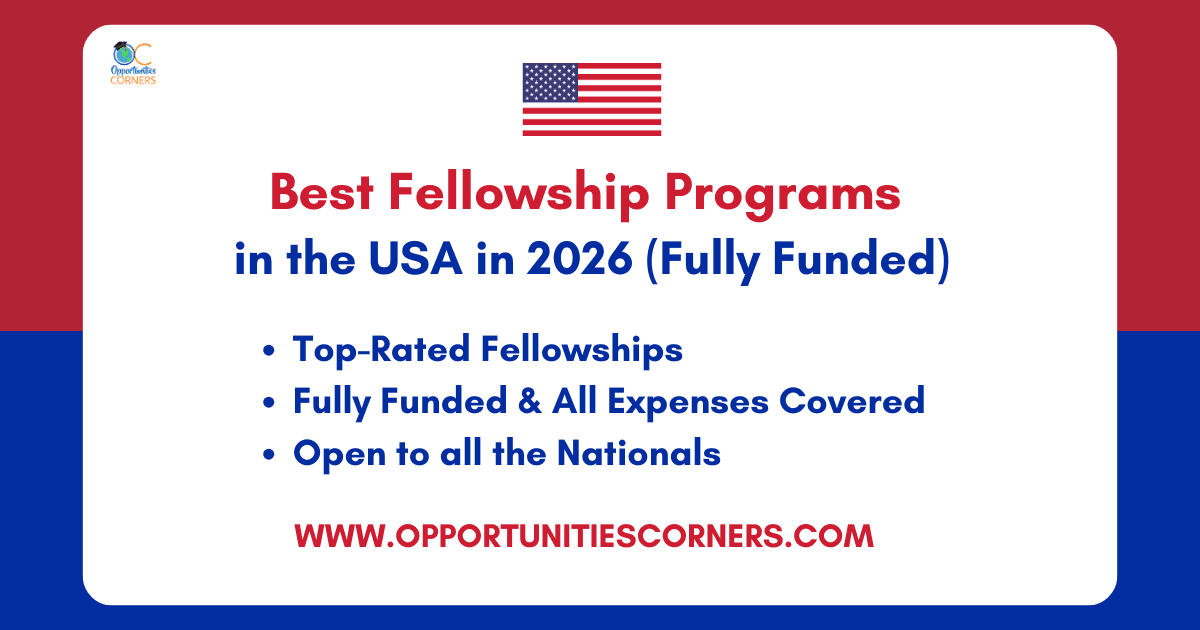Best Fellowship Programs in the USA in 2026 (Fully Funded)

Competitive Fellowship Programs in the U.S. Attract Global Talent for 2026
The United States remains a prominent destination for international scholars and professionals seeking advanced training and research opportunities. For 2026, a range of fully funded fellowship programs are attracting a diverse pool of applicants, highlighting the U.S.'s continued commitment to fostering global collaboration and innovation. These programs, offered by leading universities, organizations, and foundations, provide financial support and access to resources that enable fellows to pursue impactful projects and contribute to various fields.
Prestigious Fellowships Open Doors to Global Scholars
Fellowships in the U.S. often represent a significant investment in individual potential, typically covering airfare, accommodation, stipends, and living expenses for the duration of the program. This comprehensive support allows fellows to focus entirely on their research, professional development, or creative endeavors. The duration of these fellowships can vary, ranging from a few weeks to several years, depending on the specific program's objectives and structure.
Notable Fellowship Opportunities
Several prominent fellowship programs are currently accepting applications for 2026:
Harvard Rowland Fellows Program: A five-year fully funded program at Harvard University in Cambridge, Massachusetts. The program fosters interdisciplinary research and collaboration. The deadline is August 15, 2025. Hubert Humphrey Fellowship: A one-year program offering professional development opportunities at various U.S. institutions. The program aims to enhance leadership skills among international professionals. Harvard Radcliffe Fellowship: A one-year residency at the Harvard Radcliffe Institute for scholars, artists, and writers. The fellowship provides a supportive environment for creative and intellectual exploration. The deadline is September 11, 2025 (Humanities, Social Sciences, Creative Arts) and September 30, 2025 (Science, Engineering, and Mathematics). Yale Emerging Climate Leaders Fellowship: A fully funded one-week program at Yale University and in Paris, focusing on climate change leadership and solutions. The program brings together emerging leaders from around the world. The deadline is August 1, 2025. Fulbright U.S. Student Program: A program supporting U.S. students pursuing study, research, or English teaching assistantships abroad. The program promotes cultural exchange and mutual understanding. The deadline is October 7, 2025. Institute of Law & AI Research Fellow: A full-time remote position focusing on research at the intersection of law and artificial intelligence.
Historical and Current Context
The tradition of fellowships in the U.S. dates back to the early 20th century, with foundations like the Ford Foundation and the Guggenheim Foundation playing a pivotal role in supporting scholars and artists. These early initiatives helped establish a culture of philanthropic support for intellectual pursuits, which continues to this day. The expansion of fellowship programs in recent decades reflects a growing recognition of the importance of international collaboration and the need to address global challenges through interdisciplinary research.
Expert Perspectives on the Value of Fellowships
Dr. Eleanor Vance, a professor of higher education at the University of Michigan, emphasizes the long-term impact of fellowship programs. "Fellowships not only provide immediate financial support but also offer access to networks, mentorship, and resources that can shape a fellow's career trajectory for years to come," she explains. "The opportunity to engage with leading experts in their field and collaborate with peers from diverse backgrounds is invaluable."
Adding to this, Dr. Robert Chen, a research scientist at the Massachusetts Institute of Technology (MIT), highlights the importance of fellowships in driving innovation. "Many groundbreaking discoveries and innovations have emerged from research conducted by fellows," he notes. "By providing funding and support for high-risk, high-reward projects, fellowship programs contribute significantly to scientific and technological advancements."
The Competitive Landscape
Securing a fellowship in the U.S. is a highly competitive process. Applicants are typically evaluated based on their academic record, research experience, leadership potential, and the potential impact of their proposed project. A strong application requires careful planning, meticulous attention to detail, and a compelling narrative that demonstrates the applicant's passion and commitment.
Looking Ahead
As the application deadlines for these fellowship programs approach, prospective applicants are encouraged to thoroughly review the eligibility criteria, application requirements, and selection process. The opportunities offered by these fellowships can be transformative, providing a platform for individuals to advance their careers, contribute to society, and make a lasting impact on the world.
Originally sourced from: Opportunities Corners
